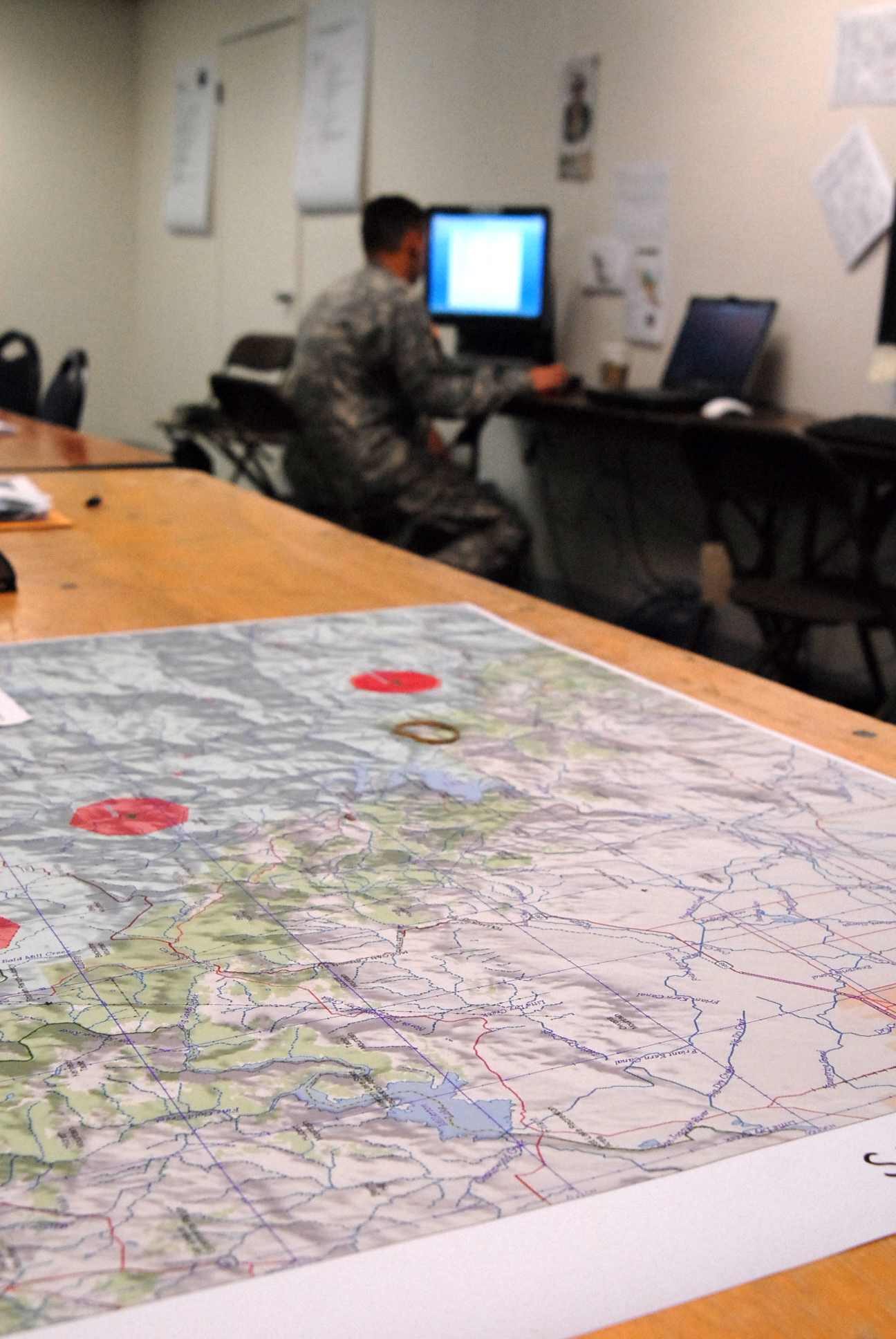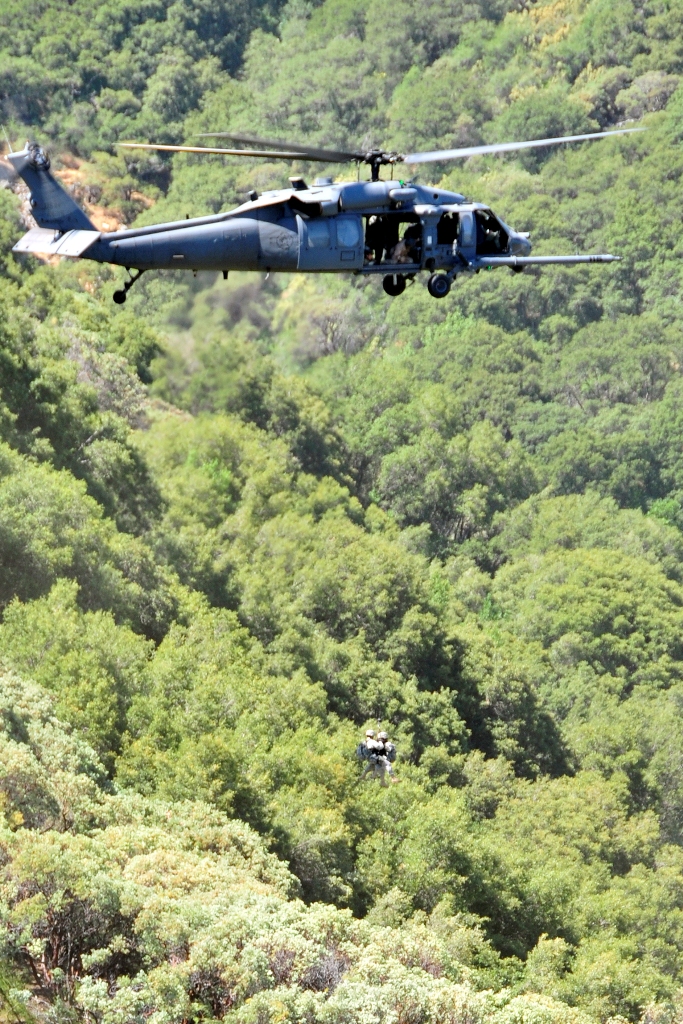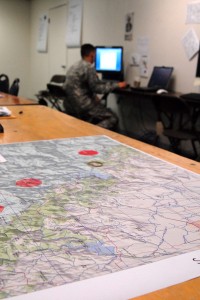During the past four years, members of the California National Guard’s Joint Task Force Domestic Support- Counterdrug (JTFDS-CD), also known as the Counterdrug program, supported multi-agency illicit marijuana eradication and reclamation operations in and around the Mendocino National Forest and California’s Central Valley. The mission was to diminish the impact of transnational criminal organizations (TCOs) in California’s communities by surveying thousands of miles of public forestland for illegal marijuana gardens, working with local law enforcement to eradicate the plants, known colloquially as “whacking and stacking.”
A primary goal of the multi-agency operations is to dismantle the illegal grower’s elaborate irrigation infrastructure to deter drug trafficking organizations from reestablishing their operations. The reclamation process also restores the land to its natural state for hikers, hunters and camping enthusiasts alike to enjoy safely once more.
Mexican cartels are responsible for nearly all large-scale marijuana gardens on public lands. “TCOs are clear-cutting trees, poaching animals, damaging water sources and poisoning the forest,” said Lt. Sam Castillo of the California Department of Fish and Game. “It’s common for the growers to use rodenticides, pesticides and fertilizers, many of which are illegally brought into this country. That eventually gets into water that is consumed by plants, animals and people.”
“The growers have decimated the land,” said a Special Event Tactical Team leader from the National Park Service. “The growers clear cut the underbrush and dig larges holes for the plants. They surrounded the gardens with barbed wire to keep the animals out. We’ve seen large amounts of fertilizer, pesticides and evidence of poaching. In one eradication mission, we even rescued an emaciated dog.”
Historically, California’s Counterdrug program has aimed to eradicate marijuana on public lands and reclaim the affected forestland through the prioritized use of military assets. This service has significantly helped local law enforcement agencies who are often hard-pressed to allocate manpower, time and resources, such as high-tech infrared camera technology and helicopters with hoist capabilities to the efforts.
“The California National Guard is essential to our success,” said Fresno County Sheriff Deputy Rick Ko. “During the past two years especially, the Counterdrug program has exceeded our expectations by providing superior service with a positive attitude.”
The Counterdrug program’s Soldiers and Airmen employ skills and tactics that are similar to real-world training for overseas war fighting or domestic peace-keeping missions such as ground reconnaissance, establishing a perimeter, and synthesizing valuable intelligence information with multiple agency allies through the use of a combined forces headquarters.
Counterdrug service members are full time military personnel. However, unlike members of the traditional “regular Army” they don’t move every three years to a new base in a new state. Having witnessed the negative impact these TCOs leave in their wake throughout the state- environmental destruction, drug trafficking and violence, Counterdrug service members are passionate about making a difference. They are personally invested in improving the communities in which they live, work and raise their families.
Violence is an increasingly expected danger law enforcement agents face in the illegal marijuana grow sites. The California Bureau of Narcotics Enforcement’s Campaign Against Marijuana Planting, a partner of the Counterdrug program, reports there have been 62 weapons discovered at California grow sites in 2011and 87 in 2010. In 2011, there were 12 homicides related to marijuana cultivation in California. Of those, six were on public lands and six were related to those growing marijuana under the pretext of medicinal uses. There were nine shootings on public lands in California in 2010, compared to only one shooting in both 2008 and 2009.
One example of a multi-agency operation was Operation Full Court Press. More than 300 personnel from 25 local, state, and federal agencies also participated operation Full Court Press, an eradication and reclamation mission that benefited Colusa, Glenn, Lake, Mendocino, Tehama and Trinity counties in July 2011. Counterdrug program Soldiers and Airmen supported the removal of more than 51,404 pounds of trash and 40 miles of irrigation line from California’s public lands. Ultimately, the operation resulted in the seizure of 632,058 marijuana plants, 1,986 pounds of processed marijuana, as well as $28,031 in US currency. Thirty-eight weapons and 20 vehicles were seized and 132 individuals arrested.
The positive results of these month-long, focused operations along with year-long support missions have proved so substantial that Counterdrug military leaders recently met to reevaluate the Counterdrug program’s goal in California. In 2010, Fresno, Madera and Tulare county logged a combined 99 independently illegal grow sites on public forestland. But in 2011, Fresno County found only 8 public land grow sites. The substantial decrease is not for lack of looking and is not an isolated statistic. Local law enforcement and drug eradication units statewide have recently reported a glaringly significant decrease of public land grow sites.
“We have created an emerging trend of no more marijuana being grown on public land,” explained Army First Lieutenant Sabino Martinez, Counterdrug’s Central California District Captain. “It’s on the Valley floor within city limits. Sometimes under the guise of a 215 grow that supposedly supports local medical marijuana dispensaries.”
While this emerging trend is beneficial to California citizens who camp, hike and fish on public forestland, it’s potentially dangerous to a new and even larger demographic of Californians—urban and suburban citizens.
“Rather than growing marijuana in the relative secrecy and anonymity afforded by remote public lands, many moved illicit operations onto private agricultural lands,” Fresno County Sheriff Margaret Mims reported to the Senate Caucus on International Narcotics Control in December. Sheriff Mims aptly identified that armed drug smugglers bring with them the dangers and violence associated with drug trafficking. On a separate occasion, Mims said, “We must work with our state and federal partners because these organized crime members don’t just grow marijuana on our public lands. They continue their criminal conduct during the off season with other illegal drug and violent activities in our local communities.”
The Senate Caucus co-chairs expressed their concern with new drug cultivation, especially in California’s Central Valley. “These are Mexican nationals who are running these operations,” said Sen. Dianne Feinstein. “They are armed and dangerous, and we ought to go after them.”
The California National Guard support is federally funded by Congress through the Department of Defense and comes at zero cost to requesting agencies. In 2011, 58 law enforcement agencies requested aviation, criminal analyst, and border surveillance support.
The resulting missions led to the seizure of 8,900 pounds of methamphetamine, 2.3 million marijuana plants, 32,000 pounds of processed marijuana, 907 pounds of cocaine, and 41 pounds of heroin. The combined value of these illicit drugs totaled more than $11 billion. Additionally, 247 weapons were removed from the streets. Removing the drugs and related effects from the streets prevents the money from filtering back into the TCO coffers, and of course, helps keeps drugs out of kid’s hands.
According to Counterdrug figures, in fiscal year 2010, Counterdrug support aided in the seizure of over $6 billion worth of illegal drugs, weapons, currency and property. In fiscal year 2009, $26 billion of the same was seized, demonstrating that Counterdrug support to California’s local law enforcement agencies is yielding high results for citizens.
The JTFDS-Counterdrug program has supported California communities for more than 20 years. Your city, county or task force can request free support by calling 916-369-4962. Check out the website at www.calguard.ca.gov/jtfdscd.
About the Author:
First Lieutenant Kara Siepmann is a Public Affairs Officer for the California National Guard.







